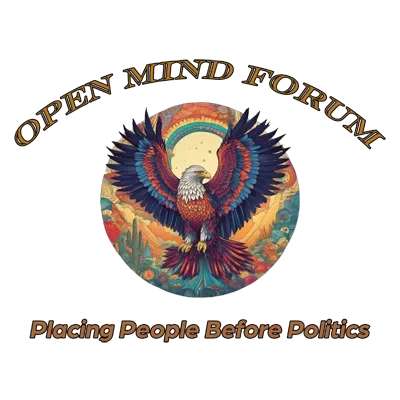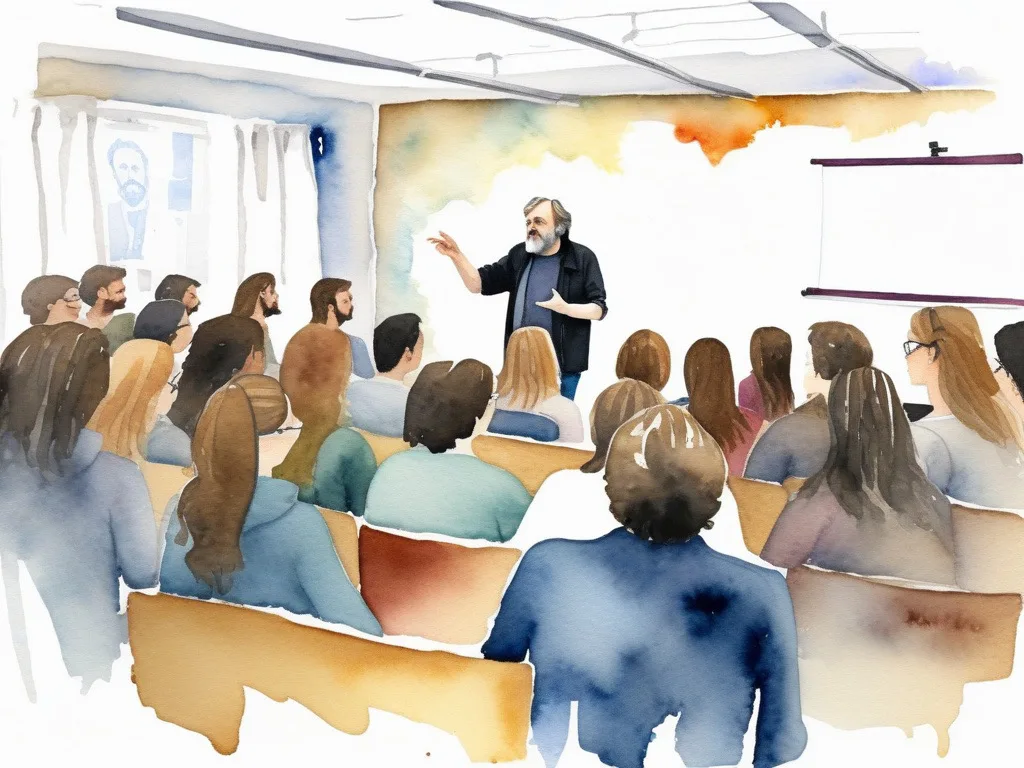Neutralizing the “Big Other”
Slavoj Žižek’s solution to neutralize the “Big Other” delves deep into the psyche of late-stage capitalism, presenting a path to dismantle liberal democracy’s role in maintaining its grip. The “Big Other”—the collective system of ideologies, rules, and values that governs society—is both the
driving force and ultimate constraint of capitalist structures, limiting individual freedoms under the guise of democratic values. Žižek critiques traditional liberal democracy for serving corporate interests at the expense of collective welfare, offering a path of symbolic “destitution” as a way forward. This concept, which proposes stripping away societal ideologies that serve capitalist interests, provides a theoretical framework for transformation. Yet, as his critics contend, Žižek’s solution lacks specific, actionable steps for achieving his vision.
Slavoj Žižek’s Solution: First a Summation of Critique
Among his most vocal critics, figures like John Gray and Ernesto Laclau argue that Žižek’s theories fall short due to their impracticality. Gray, while lauding Žižek’s astute criticisms of capitalism’s inherent failures, claims Žižek’s focus on “abstract radicalism” leaves his audience without a road map (Gray, 2019). Laclau takes this a step further, suggesting Žižek’s sweeping critiques are ultimately paralyzing because they emphasize destruction without feasible reconstruction (Laclau, 2015). Terry Eagleton echoes this sentiment, arguing that Žižek’s work often relies on “revolutionary pessimism” rather than a practical vision for societal betterment (Eagleton, 2021).
Slavoj Žižek’s Solution: A Framework for Change
Yet, Žižek’s theoretical framework does include pathways for potential change. For example, he advocates for what he calls “radical acts”—individual and collective gestures that disrupt the status quo, revealing the artificiality of capitalist ideology. In Living in the End Times, Žižek examines the 2008 financial crisis as a moment when capitalism’s ideological structures began to fracture, offering a glimpse into how crises might catalyze transformation (Žižek, 2010). According to Žižek, moments of collapse, like the financial meltdown or even the recent COVID-19 pandemic, unmask the “Big Other,” revealing the failures of capitalist governance in addressing public welfare and encouraging a rethinking of societal values (Žižek, 2020).
One of Žižek’s proposed avenues for radical change lies in his analysis of symbolic destitution, which involves rejecting capitalist values and recognizing the “false consciousness” that fuels consumerism. He draws parallels to psychoanalytic theory, suggesting that just as the individual must relinquish dependency on the “big Other” (akin to the father figure in Lacanian psychoanalysis), so must society sever its ideological ties to capitalist structures. This entails moving away from the notion of “freedom” as defined by capitalist consumption and moving towards a more egalitarian vision of communal life (Žižek, 2012). By urging individuals to see beyond materialism, Žižek aims to break the grip of neoliberal ideology.
A closer look at his proposed methods reveals practical, if abstract, ideas. Žižek points to worker cooperatives and decentralized forms of governance as small-scale models for a post-capitalist future. While these concepts are not new, Žižek envisions them free from capitalist demands, embedded in systems that prioritize collective welfare over profit. For instance, he explores the idea of “commons-based peer production,” where individuals produce and share resources cooperatively. In Žižek’s view, this model undermines capitalist production’s exploitative nature by reframing work as a communal activity, fostering economic equality and solidarity (Žižek, 2014).
Slavoj Žižek’s Solution: Critics Again?
Despite these suggestions, critics like Simon Critchley assert that Žižek’s solution, while intellectually compelling, lacks grounding in real-world application. Critchley argues that Žižek’s reliance on symbolic gestures over systemic change fails to address the complexities of dismantling entrenched power structures (Critchley, 2016). Žižek, however, rebuts that his critics miss the point; he contends that focusing on minute steps within a fundamentally corrupt system only strengthens its hold. Instead, Žižek urges collective disillusionment with the capitalist “Big Other” as the first step in building an entirely new system.
Slavoj Žižek’s Solution: A Radical Stance to Exploitation
To this end, Žižek’s solution may seem radical, but he believes it necessary. In his view, society must undergo a psychological “reset” to reject the values propping up late-stage capitalism. He foresees this reset sparking new governance models that emphasize ethical, communal values and challenge
liberal democracy’s corporate entanglements. This solution, he admits, is neither quick nor easy, but he insists that without a break from ideological capitalism, even the most well-intended reforms will fail. In response to critics, Žižek maintains that drastic measures are essential, positing that gradual reforms cannot dismantle a system designed to self-perpetuate. Ultimately, Žižek’s work prompts readers to question whether real change is achievable without a complete ideological transformation.
Žižek’s solution to neutralize the “Big Other.” Žižek contends that humanity’s reliance on capitalism stems from an ingrained distrust—a symptom of ideological conditioning that pits individual against individual. According to Žižek, overcoming capitalism means dismantling the culture of fear and competition, which capitalism perpetuates. Yet, he acknowledges that any shift away from this ideological structure will likely be turbulent.
Slavoj Žižek’s Solution: Change Emerging from a Dystopian Era
In Žižek’s view, a transition may indeed carry a dystopian aspect, as it would involve destabilizing the very frameworks that define current societal order. He warns of a potential period of disorientation or even chaos, what he calls “symbolic destitution,” where the familiar ideological

supports vanish, leaving individuals without conventional certainties. Žižek sees this period as necessary for erasing the dominance of the “Big Other” and giving way to new ways of thinking and governance (Žižek, 2010). He compares it to the “traumatic” rupture in psychoanalysis, where confronting unconscious fears ultimately leads to personal transformation. However, on a societal scale, such a rupture could be profoundly unsettling.
Žižek does offer some guidance on this point, albeit cautiously. He proposes that establishing a post-capitalist society may require a gradual, though often jarring, deconstruction of capitalism’s hold on individual and collective consciousness. Rather than calling for mass violence, Žižek emphasizes the power of smaller, radical acts of solidarity and community-based initiatives as forms of resistance. For instance, he supports cooperative models in which local communities manage resources collectively, undermining the profit-driven motives of capitalist production without imposing violent upheaval (Žižek, 2014). This suggests that rather than sweeping, systemic change, society might benefit from localized transformations that demonstrate alternatives to capitalist governance.
Slavoj Žižek’s Solution: Remaining Ambiguity
However, Žižek remains ambiguous about whether these steps alone could dismantle capitalism on a global scale. He points to environmental crises, pandemics, and economic downturns as pivotal “events” that disrupt the status quo, often forcing society to reconsider priorities beyond capitalist gain (Žižek, 2020). Yet he also questions whether society will learn from these crises or simply rebuild capitalist structures with slight adjustments. In this sense, he posits that society must undergo a psychological shift, embracing communal trust and equality over competition and fear, to prevent merely cycling through crises.
Ultimately, Žižek’s critics argue that without a more concrete, visionary blueprint, his ideas risk collapsing under their own abstraction. Žižek himself seems to embrace this ambiguity, suggesting that a single solution may be less effective than a constellation of decentralized movements disrupting capitalism incrementally. He believes that this will lead to a new social ethos based on trust and collective well-being, but he concedes that this is a radical reimagining that may take generations to materialize fully (Žižek, 2012). Whether society can bridge the gap between capitalism and a cooperative, trust-based model without massive upheaval remains an open question.
In the end, Žižek insists that confronting the “Big Other” requires collective courage to imagine alternatives and accept discomfort and uncertainty. It challenges individuals to reimagine their identities outside of consumerism and possessive individualism, thus eroding capitalism’s foundation. Whether this path emerges gradually or through societal shocks, Žižek’s solution rests on humanity’s ability to act in solidarity, rising above distrust and isolation. And while his critics may press him for clearer methods, Žižek would argue that the answer lies less in rigid blueprints and more in collective readiness to venture beyond capitalism’s ideological boundaries.
Sources Cited
Critchley, S. (2016). The Faith of the Faithless: Experiments in Political Theology. Verso.
Gray, J. (2019). False Dawn: The Delusions of Global Capitalism. New Press.
Žižek, S. (2010). Living in the End Times. Verso.
Žižek, S. (2012). The Year of Dreaming Dangerously. Verso.
Žižek, S. (2014). Trouble in Paradise: From the End of History to the End of Capitalism. Verso.
Žižek, S. (2020). Pandemic!: COVID-19 Shakes the World. Verso.
Suggestions for Further Reading
- The Sublime Object of Ideology by Slavoj Žižek – Examines how ideology unconsciously influences society’s values and behaviors.
- Hope Without Optimism by Terry Eagleton – Investigates paths toward social reform beyond capitalist frameworks.
- In Defense of Lost Causes by Slavoj Žižek – Analyzes historical revolutionary movements, drawing lessons for contemporary political structures.
- False Dawn by John Gray – Assesses neoliberal capitalism’s influence on modern politics, offering a critical perspective.
- On Populist Reason by Ernesto Laclau – Discusses the function of populism within ideological structures, particularly capitalism.
- Capitalist Realism by Mark Fisher – Explores how capitalist ideology permeates daily life and limits alternatives.
- Living in the End Times by Slavoj Žižek – Investigates capitalism’s crises, envisioning potential transformative socio-political systems.
- The Faith of the Faithless by Simon Critchley – Questions political allegiance and communal values within modern ideology.
Disclaimer: The images and videos in this post are AI-generated creations, intended purely for illustrative and conceptual purposes. They are not real-life representations and should not be interpreted as such. Their sole purpose is to offer a visual means of exploring the topics discussed in this post.




